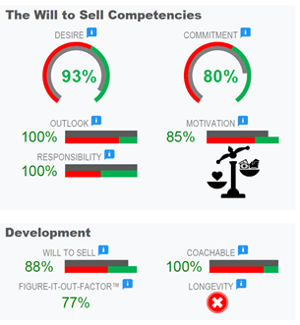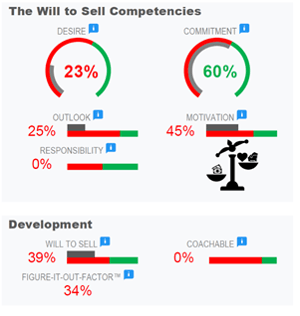As you take stock of your team’s performance, what concerns you most? Is it the challenge of maintaining your company’s market share? Are you worried that your salespeople are not selling? Are you concerned that they even have what it takes to sell?
Hiring better salespeople is one of the biggest problems identified by the companies participating in our programs. The question is always, “How do I hire better salespeople?” Unfortunately, there is no simple answer to this question. But one thing you must recognize is that you and your process are responsible for the quality of the salespeople on your staff today. In other words, your recruiting process is perfectly designed for the team you have. So, if you need to hire better salespeople, you will need to change your recruiting process.
Recruiting is like sales. A salesperson must have a system. They must have a pipeline. Their activity must be consistent. Like the salesperson, you must have a system and you must execute the recruiting process exactly like you wish your salespeople to execute their sales process. Recruiting, like selling, is not a “sometime” thing — it must be a consistently planned and implemented activity.
Build a Recruiting Pipeline to Start Hiring Better Salespeople
You must have a Recruiting Pipeline, like your salesperson has a Prospecting Pipeline. Individual salespeople are required to fill their Prospecting Pipeline. Sales managers and sales leaders must be required to fill their Recruiting Pipeline. After all, if you had salespeople who didn’t have sufficient Prospecting Pipelines, you would be concerned about their future and the future of your company. As the person responsible for hiring better salespeople and driving sales production, the same should hold true for you and your Recruiting Pipeline.
To implement a Recruiting Pipeline, ask your sales team to let you know if they run across someone at the networking opportunities they attend. Ask them who they know. “Who should we be talking to? Do you know a salesperson who might be looking to make a change?” You must make your own efforts as well. Sometimes salespeople will not wish to offer up names, thinking that these people might present competition.
Meet with other employees to find out who they know who might be a good fit. Put together a Recruiting Team and ask these people to submit candidate names once per week. Implement a Recruiting Huddle and hold yourself and everyone accountable. Talk to your neighbors, your tennis partner, your golf friends. Ask them who they know who might be looking for a new opportunity in sales. You never know where you will find your next producer, and your goal is to fill your Recruiting Pipeline with prospective hires.
You must also determine your Pipeline Success Formula — how many names must you have in your pipeline to hire one good salesperson? How many names must you acquire to find one candidate that you will hire, contract and on-board? If you don’t already have a Recruiting Pipeline and have not done this consistently, you will have to guess until you get enough experience.
Hiring better salespeople requires you to be proactive. Have a consistent process, do the behaviors and inspect your activity just like you do your sales team’s activities.
Identify the Ideal Salesperson Candidate
Last but not least, you must identify the Ideal Salesperson Candidate. What are the skills and strengths most necessary for success in your company, industry and marketplace? It is imperative that you determine a profile for the ideal salesperson because otherwise you might hire just to fill an opening, thinking a warm body is better than none. In this process you must identify the type of salesperson you need and how your current sales staff measures up to the ideal salesperson.
I recommend an objective assessment that screens for sales skills, weaknesses and compatibility like the OMG Sales Candidate Screen. The Sales Candidate Screen gives you a succinct and accurate glance at a recruit. Will they take responsibility for their successes and failures? Will they get referrals? Can they handle prospects? Will their desire to be liked get in the way of selling? Do they take put-offs? Will they make presentations to unqualified prospects? Are they a hunter who will go out and find business, or a farmer who cultivates current business?
So, you must know what you are looking for in a candidate and you should know in advance the problems that a candidate is bringing to the table. Clearly resumes are not the answer because they typically present a stellar candidate. Face-to-face interviews are often misleading and can take you off track if you particularly like or dislike a candidate.
Next, you must implement a 5-Minute Prescreen Telephone Interview with the goal of initial discovery. Is the resume accurate? How does the candidate handle the phone call? In this case, you are the prospect, and your candidate needs to sell you on themselves.
The idea is to create an environment on the phone just like the salesperson will face when they are prospecting. Thus, it should be a bit uncomfortable. You must find out how the sales candidate will act under pressure.
A good sales candidate will try to engage you by asking questions. This means that they will likely attempt to do the same in a sales situation with a prospect who is rejecting them. Perhaps they will even try to close for an interview. This means that they will likely attempt to do this with a prospect. If they do one or the other, they pass the 5-Minute Interview and are on to the next step.
Remember, your current recruiting process is perfectly designed for the team you have. Are you ready to make changes in your recruiting process so that you can hire better salespeople?







